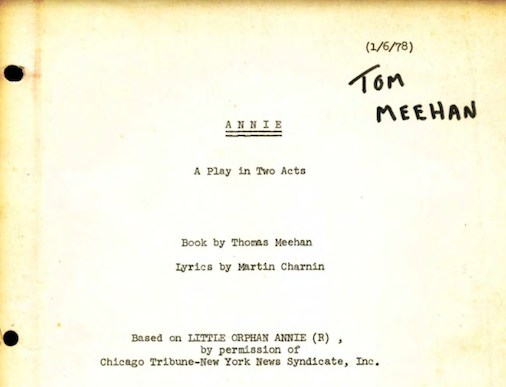
Annie. Photo courtesy of the Hamilton College Archives.
I am pleased to announce that the annotated manuscript of Hamilton alum Thomas Meehan’s ’51
Annie
safely arrived in the College Archives a little over a week ago. If you have not read the alumni spotlight featuring Thomas Meehan from a previous
Spectator
issue, that is alright (but you really should). As a quick refresher, Meehan is a three-time Tony Award-winning writer who majored in English during his time at Hamilton. A member of Theta Delti Chi, Meehan worked at
The
Spectator
, played basketball and was known for his party spirit. He praised Hamilton College for providing a liberal arts education and would eventually establish the Thomas E. Meehan Prize in Creative Writing. In the 1970s, Meehan was approached to adapt the comic strip
Little Orphan Annie
into a musical which earned him the first of his three Tony awards. Meehan also worke with Mel Brooks to create
The Producers,
which won 13 Tony awards. In 2002, Meehan collaborated with author Mark O’Donnell to make a stage adaptation of
Hairspray,
which earned Meehan his second Tony. Other productions such as
Elf
and
Chaplin
are also attributed to Meehan.
When lyricist Martin Charnin approached Meehan and asked him to adapt
Little Orphan Annie
for the stage, Meehan responded, “You’ve got to be kidding.” Despite his initial hesitation, Meehan accepted the challenge and began writing the manuscript. For those unaware,
Annie
is a musical that features an orphaned girl named Annie who gets adopted by billionaire Oliver Warbucks. The antagonistic head of the orphanage, Miss Hannigan, becomes jealous that Annie will get everything she wants and plans to use the situation to her advantage. Miss Hannigan’s brother and his girlfriend masquerade as Annie’s parents to trick Warbucks into giving them money. Sometime during the musical, Annie meets President Franklin D. Roosevelt who becomes inspired by Annie’s optimism. For Meehan, “Annie is actually a metaphorical play. The girl is not real, particularly when you get into Act II and she stands on Roosevelt’s table in the conference toom and starts singing ‘Tomorrow’… she is the metaphor for goodness and honesty and integrity in government.” He also envisioned her as a 20th century American female version of other famous orphaned characters like Oliver Twist.
The annotated manuscript received by the College Archives does not differ much from the final product. Meehan often adds, subtracts or refines dialogue but the scene order and general plot are left untouched. The first significant comment Meehan makes is in Act I, Scene 7 in which he marks a section of dialogue between Miss Hannigan, her brother Rooster and his girlfriend Lily. Meehan writes in the margin, “replace with mention of Annie and unfairness.” While the previous version showed Miss Hannigan complaining about Annie living the life of luxury, Meehan’s revision of shifting the conversation to unfairness makes Miss Hannigan’s dislike of Annie a little more understandable. Meehan’s comments in Act 2, Scene 2 add more clarity and background context to Rooster and Lily’s criminal past as well. Other markings made by Meehan are more obsure: a simple bracket in once place, an underline in another. The lack of comments with these markings convey the sense that Meehan did not intend for this version to be seen; this manuscript was for his revision purposes alone. Overall, the
Annie
manuscript received by the College Archives is a fun new addition containing insight into the comments and creative process of one of Hamilton’s most prolific playwrights.
























